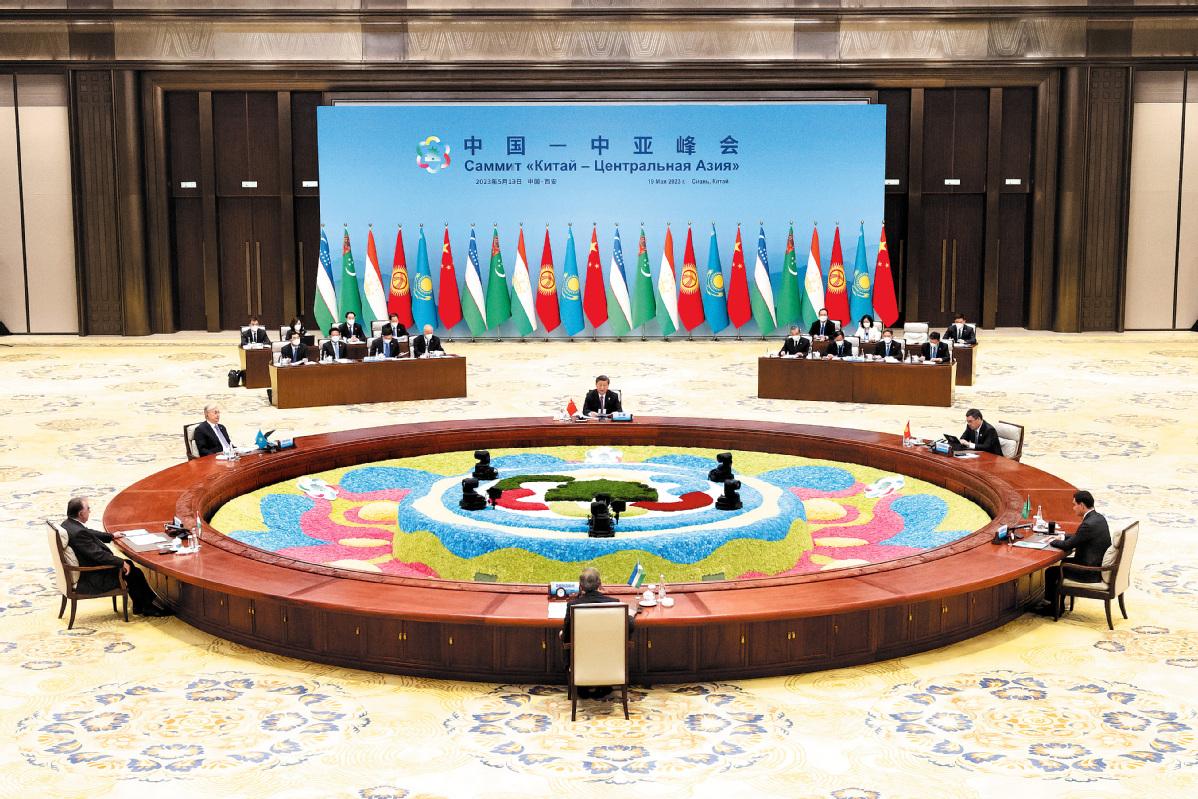
President Xi Jinping chairs the first China-Central Asia Summit and delivers a keynote speech in Xi'an, Shaanxi province, on Friday. [Photo by Ding Haitao/Xinhua]
By SUN ZHUANGZHI
The deliberations and decisions made at the China-Central Asia Summit, which concluded in Xi'an, Shaanxi province, on Friday, will promote closer cooperation between China and the five Central Asian states.
President Xi Jinping and leaders of the five Central Asian countries announced on Friday their decision to set up a "China-Central Asia Summit Mechanism", under which the six countries will take turns to host the summit every two years, and establish a permanent secretariat for the mechanism in China. The next summit will be held in Kazakhstan in 2025.
In particular, the six countries agreed to promote in-depth cooperation in fields such as transportation, trade and economy, investment, industry, agriculture, energy, customs and people-to-people exchanges.
China and its Central Asian neighbors have a long history of communication dating back to the ancient Silk Road. Talking about the recent past, China was one of the first countries to recognize and establish diplomatic relations with the five Central Asian countries after they gained independence in 1991.
Heads-of-state diplomacy at the Xi'an summit has elevated China-Central Asia cooperation to a higher level. China supports peace, cooperation and common development, and is making efforts to initiate a dialogue on security and cooperation in the region. Also, work on a road map for boosting regional cooperation has been completed, and the Treaty on Friendship, Good Neighborliness and Cooperation for the Development of Central Asia in the 21st Century signed.
The diplomacy on display in Xi'an can deepen mutual strategic trust, and boost mutual support for the core interests and major concerns of partner countries. On Friday, President Xi expounded on how to build a China-Central Asia community with a shared future, and called on all sides to continue to strengthen Belt and Road cooperation and help implement the Global Development Initiative, the Global Security Initiative, and the Global Civilization Initiative. He also said the six countries should resolutely oppose external interference in their internal affairs and outside forces' attempts to instigate "color revolutions", and maintain their zero tolerance for the three evil forces of terrorism, separatism and extremism.
Heads-of-state diplomacy has also helped establish new multilateral cooperation mechanisms. In fact, China and the Central Asian countries have already established a mechanism to hold regular meetings, and the China-Central Asia Summit Mechanism will further expand intergovernmental cooperation and help promote people-to-people exchanges.
In today's fast-changing and turbulent world, the Central Asian countries face both internal and external challenges including geopolitical conflicts, extremism and the aftereffects of the COVID-19 pandemic. In this regard, cooperation with China will help them to not only practice their pragmatic diplomacy, but also better safeguard their sovereignty and national security.
The six countries have agreed to work together to build a China-Central Asia community with a shared future because they know mutual respect, good neighborliness, mutual support, and win-win cooperation are critical to strengthening both bilateral and multilateral relations, and increasing cross-border trade.
All the five Central Asian countries have their respective reform programs which are aimed at boosting their economy, improving people's livelihoods and minimizing, if not overcoming, external risks.
Besides, 2023 marks the 10th anniversary of the Belt and Road Initiative, which the Central Asian countries have participated in and benefited from. Further, the Belt and Road Initiative can help the Central Asian countries to implement their respective reform programs, which can play a significant role in improving the livelihoods of their peoples and boosting their economic growth.
The integration of the Belt and Road Initiative with the new development plans of the Central Asian countries will be an important step in that direction. The five Central Asian states should work together to build a joint economic corridor to promote common development. Especially, the Central Asian countries, which are land-locked, can gain more convenient access to the sea if they deepen cooperation with China.
Under the framework of the Belt and Road Initiative, China and the Central Asian countries have proposed pragmatic measures for improving "hard connectivity" of infrastructure and "soft connectivity" of rules and standards. China is also working with the Central Asian countries to better facilitate the flow of goods and people by, among other things, establishing commodity circulation networks and border trade centers, and expanding cooperation in artificial intelligence, big data, cloud computing and other sectors for the benefit of peoples on all sides.
Expanding people-to-people exchanges has helped China and the Central Asian countries to maintain long-term cooperation, with bilateral and multilateral cooperation bolstering friendship and good neighborliness, making it possible for university students and professionals from the Central Asian countries to apply to study and receive training in China.
Also, China provided millions of vaccines and other medical supplies to the Central Asian countries to help them contain the COVID-19 pandemic, strengthening the bond between China and the Central Asian region as a whole.
In short, the summit has reinforced the consensus that China and the Central Asian countries should build a community with a shared future, and the summit mechanism will have an impact beyond the region.
The author is the director of the Institute of Russian, Eastern European & Central Asian Studies, Chinese Academy of Social Sciences.

 中文
中文



